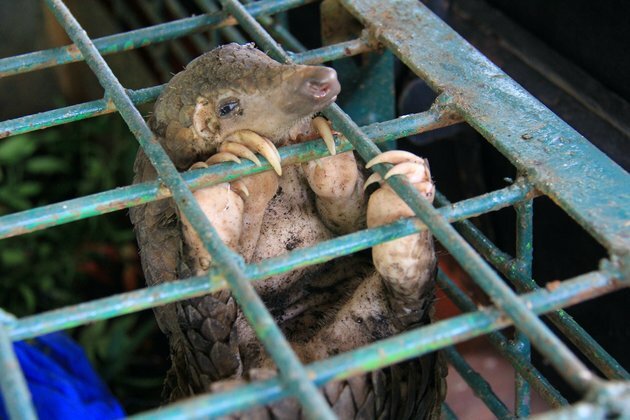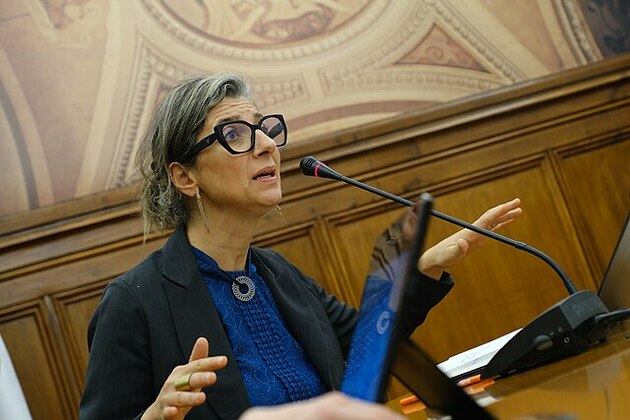How can we stop people wanting to buy illegal wildlife products?
The Conversation
09 Jul 2020, 16:12 GMT+10

Conservationists have been working for decades to save species such as pangolins and rhinos from illegal hunting and trading. And, with fears that the coronavirus pandemic originated from the wildlife trade, there's never been more pressure to find solutions.
One approach is to try and reduce demand for wildlife products so that the market effectively dries up. Persuading people to stop eating pangolins or using rhino horn in medicine is likely to be difficult, but perhaps easier than enforcing a global ban on the international trade and less heavy-handed than stopping poachers.
Since 2015, 32 countries have pledged to eradicate the market for illegal wildlife products and provided funding for projects aimed at encouraging customers to change their behaviour. But how effective are these likely to be?
It's a relatively new approach - and not one that scientists have thoroughly tested. We decided to review research on behaviour change in public health to give us an idea of what works and what doesn't. These ranged from efforts by community workers to improve sanitation in rural India, to education programmes on avoiding steroids among high school American football players in the US.
Money, motivations and mores
Projects designed to persuade people to change their behaviour rarely affect everyone they target. A study of health campaigns that used mass media channels, from television to billboards, showed that, on average, just 8% of the target audience changed their behaviour. One project which ran public television advertisements and distributed cheap devices able to estimate blood alcohol levels to shops and bars resulted in a 5% decrease in drink-driving incidents.
But campaigns that tried to get people to do something new, such as use seat belts regularly, were more successful than those that tried to get people to stop doing something, such as quit smoking. So conservationists may have more success by promoting a safe and acceptable alternative to a wildlife product than just telling consumers to stop altogether.
The most effective projects target a specific audience and consider the other factors competing with their message too - like anti-obesity projects aiming to overcome TV adverts for unhealthy food. But even then, success is not guaranteed. Another recent study found that less than half of high-quality health campaigns have positive results.
Other fields attempting to change the behaviour of their viewers, such as advertising, tend to have more money and experience than people trying the same methods in conservation. This all suggests that progress in reducing demand for wildlife products will be slow. A single campaign aimed at rhino horn buyers in Vietnam might reduce demand, but it probably won't stop it altogether.
Read more: Rhino horn must become a socially unacceptable product in Asia
Research also shows that behaviours change when projects account for a person's motivations and desires. This is why incentivising people to quit smoking with cash prizes (so-called "quit and win" contests) rarely work in the long term. Fewer than one in 500 smokers maintained their good habits when the rewards stopped, because the underlying reasons for smoking weren't addressed,
The same issue applies to conservation. Projects are likely to fail or have unintended consequences if they don't tackle the things motivating people to buy wildlife products. In Japan, the horns of rhinos and saiga antelopes are believed to have similar medicinal effects. When the 1980 international trade ban on rhino horn came into effect, the Japanese traditional medicine industry just switched to saiga horn instead. Unfortunately, the saiga antelope is now classified as Critically Endangered, due in part to illegal hunting for horns.
Luckily, market research can help us understand these motivations, and work out who may be most receptive to change. For instance, a status-conscious consumer in Vietnam might be set on buying wild meat, but farmed meat will be more acceptable to those concerned about price.
Tread carefully
Campaigns can also make things worse if they accidentally change a person's perceptions and values. One drug prevention programme aimed at teenagers in the US actually increased illegal drug taking this way. It involved uniformed police officers visiting schools to warn students about the harmful effects of drugs, making drug use seem more common than it actually was, and so more socially acceptable.
Equally, many illegal wildlife products, such as pangolin meat and scales, are used by a relatively small proportion of people. Mass media campaigns give the impression that eating pangolins is more much common, and could unwittingly encourage others to follow suit.
No single approach or project is going to work on its own. If conservationists want to save a species through reducing demand for wildlife products, we must plan for the long term and think about what could go wrong.
We don't want to undermine public support and create tensions in communities by acting without fully considering the consequences. This is what happened when a ban on wild meat in Sierra Leone turned people against expert advice. During the 2013-2016 Ebola outbreak, the government told villagers that wild meat was risky, but this contradicted the everyday experiences of people who had safely eaten it for generations. Communities became suspicious and suspected a sinister motive behind the ban.
Changing people's behaviour is possible if we can promote new habits, tackle the core motivations behind buying illegal wildlife products, consider the cultural context of using those peoducts and focus on a target audience without making the illegal behaviour seem more widespread than it actually is. Armed with this knowledge, there is hope for turning the tide against this destructive trade.
Authors: Laura Thomas-Walters - PhD Candidate in Conservation, University of Kent | Bob Smith - Director, Durrell Institute of Conservation and Ecology, University of Kent | Diogo VerУТssimo - Research Fellow in Conservation, University of Oxford 
 Share
Share
 Tweet
Tweet
 Share
Share
 Flip
Flip
 Email
Email
Watch latest videos
Subscribe and Follow
Get a daily dose of Orlando Echo news through our daily email, its complimentary and keeps you fully up to date with world and business news as well.
News RELEASES
Publish news of your business, community or sports group, personnel appointments, major event and more by submitting a news release to Orlando Echo.
More InformationInternational
SectionOver 60 companies named in UN report on Israel-Gaza conflict
GENEVA, Switzerland: A new United Nations report alleges that dozens of global corporations are profiting from and helping sustain...
UK lawmakers desigate protest group as terrorist organization
LONDON, UK - Lawmakers in the United Kingdom have voted overwhelmingly to proscribe the direct-action group Palestine Action as a terrorist...
Dalai Lama to address Buddhist conference, reveal succession plan
DHARAMSHALA, India: The Dalai Lama is set to address a significant three-day conference of Buddhist leaders this week, coinciding with...
US Supreme Court backs Texas efforts to shield minors online
WASHINGTON, D.C.: In a significant ruling last week, the U.S. Supreme Court upheld a Texas law requiring age verification for users...
Turkey, France battle wildfires amid early Europe heatwave
ISTANBUL/PARIS/BRUSSELS: As searing temperatures blanket much of Europe, wildfires are erupting and evacuation orders are being issued...
Venetians protest Bezos wedding with march through the town
VENICE, Italy: Over the weekend, hundreds of protesters marched through the narrow streets of Venice to voice their opposition to billionaire...
Florida
SectionUS Supreme Court backs Texas efforts to shield minors online
WASHINGTON, D.C.: In a significant ruling last week, the U.S. Supreme Court upheld a Texas law requiring age verification for users...
Native leaders, activists oppose detention site on Florida wetlands
EVERGLADES, Florida: Over the weekend, a diverse coalition of environmental activists, Native American leaders, and residents gathered...
Russia will not "back down" from goals in Ukraine, Putin tells Trump
Washington DC [US], July 4 (ANI): Russia President Vladimir Putin on Thursday held a telephonic conversation with US President Donald...
Trump attacks communist lunatic New York mayoral candidate
The US president has vowed to stop Zohran Mamdani from destroying the city US President Donald Trump has accused Democratic mayoral...
Real Madrid, Borussia Dortmund storm into quarterfinals of FIFA Club World Cup 2025
Florida [US], July 2 (ANI): Spanish giants Real Madrid and German club Borussia Dortmund on Wednesday became the last two teams to...
Amid split, Katy Perry, Orlando Bloom "want to protect" their daughter
Washington, DC [US], July 2 (ANI): Katy Perry and Orlando Bloom have called off their relationship. Amid the split, they both 'want...












